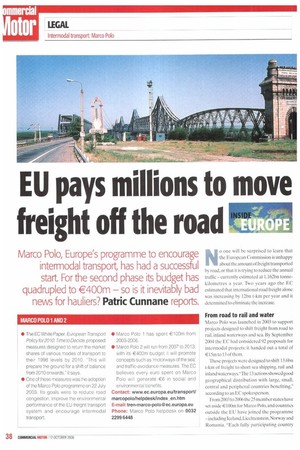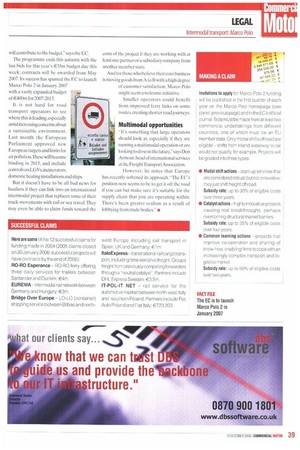EU pays millions to move
Page 38

Page 39

If you've noticed an error in this article please click here to report it so we can fix it.
freight off the road EUROPE
Marco Polo, Europe's programme to encourage intermodal transport, has had a successful start. For the second phase its budget has quadrupled to €400m — so is it inevitably bad news for hauliers? Patric Cunnane reports.
No one will be surprised to learn that the European Commission is unhappy about the amount of freight transported by road, or that it is trying to reduce the annual traffic— currently estimated at 1.162bn tonnekilometres a year. Two years ago the EC estimated that international road freight alone was increasing by 12bn t-km per year and it determined to eliminate the increase.
From road to rail and water Marco Polo was launched in 2003 to support projects designed to shift freight from road to rail, inland waterways and sea. By September 2004 the EC had considered 92 proposals for intermodal projects; it handed out a total of €15m to 13 of them.
These projects were designed to shift 13.6bn t-km of freight to short sea shipping, rail and inland waterways,"The 13 actions showed good geographical distribution with large, small, central and peripheral countries benefiting," according to an EC spokesperson.
From 2003 to 2006 the 25 member states have set aside €100m for Marco Polo, and countries outside the EU have joined the programme —including Iceland,Liechtenstein,Norway and Romania. Each fully participating country will contribute to the budget." says the EC.
The programme ends this autumn with the last bids for this year's €35m budget due this week; contracts will he awarded from May 2007. Its success has spurred the EC to launch Marco Polo 2 in January 2007 with a vastly expanded budget of €400m for 2007-2013.
It is not hard for road transport operators to see where this is leading, especially amid increasing concerns about a sustainable environment. Last month the European Parliament approved new European targets and limits for air pollution.These will become binding in 2015, and include controls on LCVs,incinerators, domestic heating installations and ships.
But it doesn't have to he all bad news for hauliers if they can link into an international intermodal project that replaces some of their truck movements with rail or sea travel. They may even be able to claim funds toward the costs of the project if they are working with at least one partner or a subsidiary company from another member state.
And for those who believe their core business is moving goods from A to 13 with a high degree of customer satisfaction. Marco Polo might seem a welcome initiative. Smaller operators could benefit from improved ferry links on some routes, creating shorter road journeys.
Multimodal opportunities
"It's something that large operators should look at, especially if they are running a multimodal operation or are looking to dos° in the future," says Don Armour, head of international services at the Freight Transport Association.
However, he notes that Europe has recently softened its approach. "The EC's position now seems to be to get it off the road if you can hut make sure it's suitable for the supply chain that you are operating within. There's been greater realism as a result of lobbying from trade bodies." •










































































































































































































